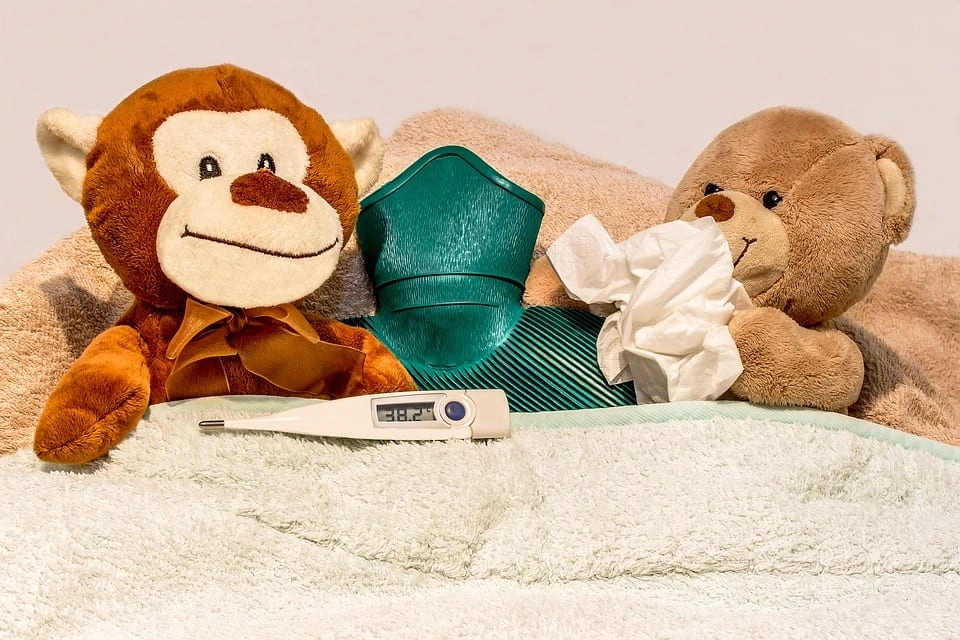By Patricia Edminster, Ph.D.
During the preschool years, many behaviors become regular responses to specific situations. In the case of childhood hypochondria – the imagining or exaggerating of medical symptoms – it’s important for parents to decide if their twins are reacting to one of several different situations in which “acting sick” brings them some type of positive feedback.
Complaining of feeling sick is certainly not only a twin-specific problem, of course. Many toddlers and young children go through periods of voicing physical complaints as signs of anxiety about something going on in their lives. In children, just as in adults, this anxiety can lead to the physical sensation of muscle tension, headaches, stomachaches and nausea. Such symptoms may be found more frequently in children whose nature seems to classify them as ‘worriers’.
Sometimes, too, children will use physical problems to avoid certain types of situations, such as being punished for something, having to take swimming lessons or visit someone they don’t like. They may also use them to get attention, if they feel they are being ignored.
Some highly sensitive children may use ‘being sick’ as a diversionary technique when they have a problem and don’t know how to solve it. They may also employ this technique when they are upset about something which they realize isn’t likely to be important enough for a parent to warrant a lot of attention. Rather than cope with handling the real problem, they will use an illness to buy time to avoid the problem and calm them down.
Finally, some children seem to have learned ‘sick’ behavior by watching parents or siblings get attention or get ‘their way’ by acting as if they were sick. Unfortunately, some adults use this behavior for many of the same reasons mentioned above. Preschoolers learn this lesson quickly if they see the behavior reinforced for others.
LESSONS IN GOOD HEALTH
Regardless of the reason for children’s complaints of symptoms of illnesses, you may want to try these suggestions to increase the chances that your multiples will not artificially create aches and pains:
- Look at your own behavior and attitudes about being sick to be sure you aren’t modeling illness as a pattern for getting attention or avoiding situations.
- Develop certain ‘rituals’ for determining if an illness is feigned or real – taking the child’s temperature, feeling her forehead, etc. Then, if she persists in complaints of illness, put her to bed; darken the room; and be kind, but don’t over-reward.
- Don’t reinforce the ‘sick child’s’ role – all children seek to have a separate identity, but you don’t want to make the sick role seem attractive.
- Don’t over-do the care giving and kindness, even when the child is truly sick. It is easy for caring parents to get caught up in making the child’s convalescence as pleasant as possible; but giving extra favors , new toys and special foods can reinforce how nice getting sick is. Show your caring equally, whether your child is healthy or ill.
- Analyze the time or situations which surround the occurrence of your child’s illnesses. Can you identify particular stressors which may be causing the symptoms? If so, then focus your attention on alleviating those stressors rather than on the physical symptoms. If, for example your child has a stomachache right before swimming lessons, maybe the message she’s trying to send is not that she’s sick, but that it’s too early for this particular youngster to accept this activity, even though her co-twin might do just fine adjusting to the lessons.
- Watch for the occurrence of illness in one twin when both co-twins are engaging in a competitive activity in which one is either more confident or competent. Again, this may be an indicator that a particular activity isn’t appropriate, developmentally, for both children.
- Be careful not to accuse your child of lying or making up his illness. To a child experiencing stress or anxiety, the physical feelings of illness are very real, not imagined, so parents need to look for the underlying causes rather than to deny the symptoms.
- Never ignore a child’s complaint of illness, even if she has a history of having exaggerated or imaginary illnesses. The illness may, in fact, be real, and medical attention may be needed. If, however, you repeatedly encounter these complaints, your child’s physician sees no illness upon exam and you have not given the child a lot of positive attention for her illnesses in the past, you may want to consult a mental health specialist to assist you in determining the cause of the behavior.
TWIN SPECIFIC WATCHWORDS
Some twins may be especially prone to imagined illnesses in two commonly encountered situations.
Situation #1
If one (or both) twins have had significant medical or health problems during his or her younger days, he or she may be prone to feeling some ongoing anxiety about her symptoms, worrying that if some of the symptoms continue even after his/her release from the hospital, he/she may become ill again.
Situation #2
One co-twin may decide that feigning illness is the only way to get a little extra tender, loving care for herself because so much has to be shared between her and her co-twin, especially her parents’ time.


